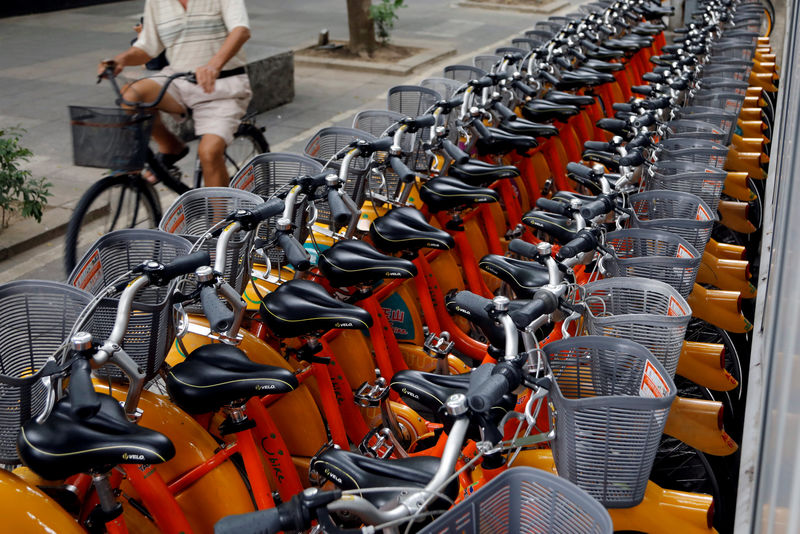By Jessica Jaganathan and Florence Tan
SINGAPORE (Reuters) - It is not quite going back to the horse, even if the bicycle was the first contraption to replace beasts as a means of personal transport.
This is a new two-wheeled animal, though, that millions of consumers in Beijing, Taipei, Singapore and cities across Asia are renting via phone apps to cover the last mile of journeys, leaving cars and motorcycles at home, and forgoing taxis.
The two-year bike-share boom has put over 16 million bikes in China alone, according to its Ministry of Transport, with more than 100 million riders registered, eating into car use and gasoline demand growth already expected to stagnate by 2025.
"I often use bike-sharing services because it's very convenient. I can find it anywhere and will not worry about losing the bike," said life-long Beijing native Wei Zhang, 36, who uses a shared bike several times a week on her commute, riding 5 km or more.
Analysts can't keep up with bike numbers, let alone estimate how much gasoline consumption growth has dropped off due to the rapid rise in bike-sharing. But it is clear from industry estimates, government reports and a Reuters survey that bike services are resulting in fewer trips by motor vehicles.
"Bike-sharing has been crazy since late last year ... The general belief is that (it) boosts the utilization of public transport as shared bikes help to complete the journey," said Harry Liu, downstream consultant with IHS Markit.
Even before the number of bike-share units began growing by multiples, analysts had already been saying greater fuel efficiency in autos and the rising use of electric cars meant gasoline's big growth story was over.
China's gasoline demand growth is expected to slow to nearly 4 percent this year, compared with 6.5 percent growth last year, said Sri Paravaikkarasu, head of East of Suez oil at FGE.
And Chinese demand for gasoline is expected to peak as early as 2025, according to state-owned China National Petroleum Corp [CNPET.UL].
"There used to be long queues of taxis waiting for customers outside train stations, but I don't see them anymore," said a Beijing analyst, who took part in a Reuters survey of bike-share users and wanted to be known only by her surname Wang.
ASIAN BIKES, ASIAN CITIES
Just in the past month, Chinese bike-sharing start-up Mobike introduced its services in Kuala Lumpur, Malaysia, and Bangkok, Thailand, as well as in U.S. capital Washington, D.C.
Mobike, which launched in April 2016, and China-owned rival Ofo have attracted combined funding of more than $2 billion from venture capital and private equity firms that include Temasek Holdings (TEM.UL), Tencent Holdings (HK:0700), DST Global and Ant Financial.
Ofo - which has more than 10 million bikes globally to Mobike's 7 million - says it is on track to increase its global bike units to 20 million over the next three months.
The investments "demonstrate investors' confidence in the global bike-sharing industry," said Lawrence Cao, head of Asia Pacific business for Ofo.
Consultancy Roland Berger said the "unforeseeable" amounts of venture capital put into bike schemes made it almost impossible to estimate the growth potential of bike operators, particularly in China, over the last two years.
Taiwan, where the government backs a bike-sharing scheme, is aiming to have bikes account for a 12 percent share in trips to work by 2020, up from about 5 percent now.
The Taipei city government is expanding bike-sharing programme Youbike - which uses docking stations - to have a bike station within a 10-minute walk of every citizen by 2018.
Singapore-owned Obike and U.S.-based VBikes - both free-range systems - are also operating in Taiwan.
"Once bike-sharing pushes it really to the limit, to the extent to impact the way people think of mobility, then it could be disruptive," said IHS's Liu.
For Reuters TV story, click here: http://reut.tv/2hvZYyE
FOUR WHEELS BAD
A survey done by Mobike of 100,000 customers across 36 cities in China found that car trips among the respondents had more than halved since its service was introduced.
A report from the Transport Commission of Shenzhen, one of China's richest cities, said more than 500,000 bike-share units there had replaced nearly 10 percent of travel by private car or 13 percent of gasoline consumption.
Bike-sharing could pose a risk to gasoline consumption "if a stronger state push to reduce carbon intensity and improve air quality translates to more drivers replacing shorter-distance driving with bike rides," said Peter Lee, an oil and gas analyst at BMI research.
Chinese growth of passenger car sales, which grew an average annual rate of 10.1 percent over 2011 to 2016, is expected to slow to 2.5 percent over the next five years, said BMI's Lee.

Still, mismanagement of bike numbers and misuse of some bicycles may attract legislation that could curb their use. New shared bikes were recently banned in some areas in the Chinese cities of Wuhan, Shanghai and Guangzhou, because of bicycles being discarded in public spaces.